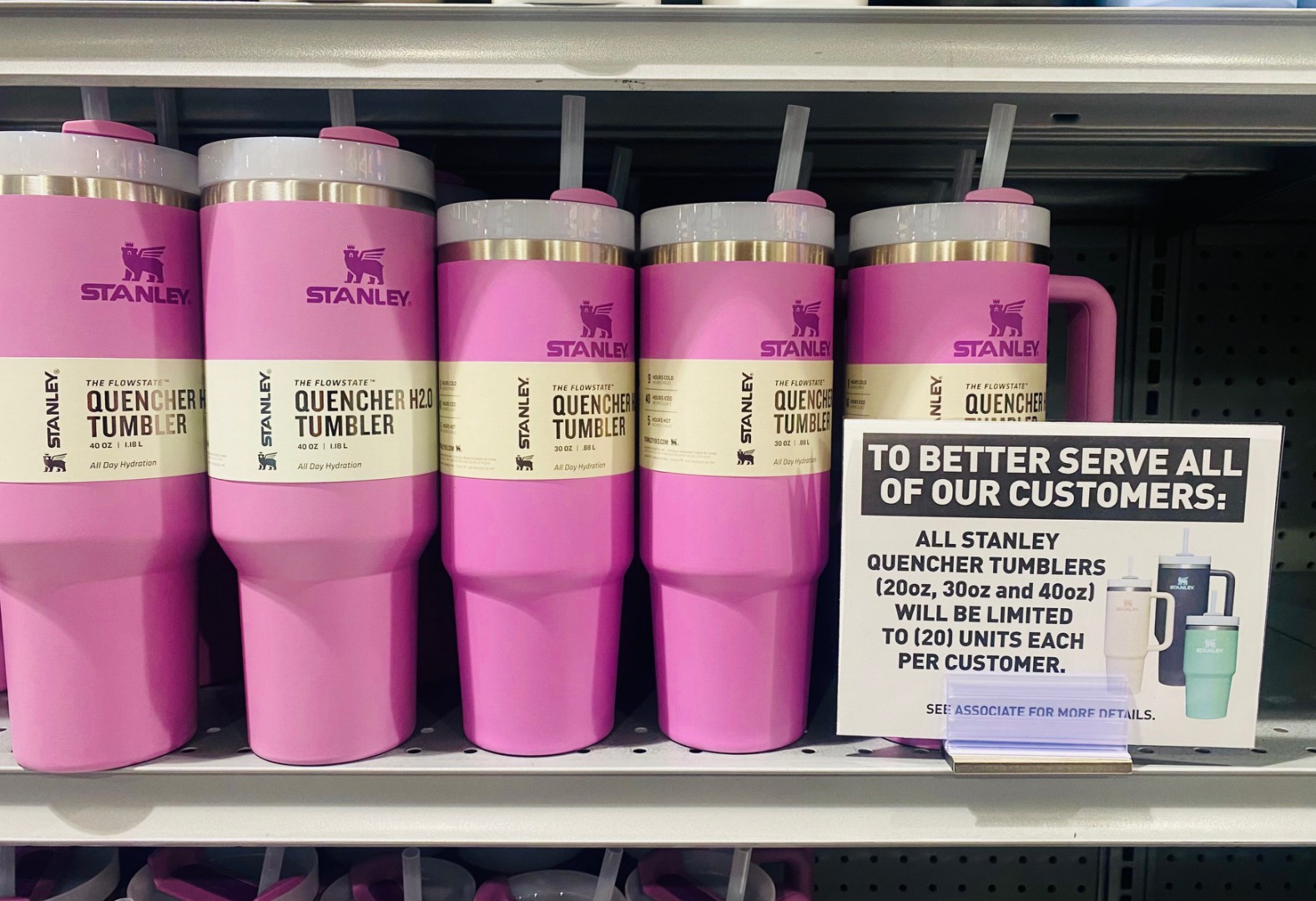
Stanley cups targeted by misleading lead contamination claims
- This article is more than two years old.
- Published on February 6, 2024 at 18:18
- Updated on March 6, 2024 at 22:58
- 4 min read
- By AFP USA
"The Leadening has begun and the Stanley girlies are not okay," says a January 28, 2024 post on X, formerly Twitter.
The post includes a screenshot from Facebook that says test swabs show Stanley cups contain lead, which can cause severe health effects in some groups (archived here).
"I rubbed it on the inside of the cup where the drink is," the Facebook user claims.
A January 23 Facebook post sharing the same screenshot says: "If you're drinking out of a Stanley cup you will be ingesting lead!"
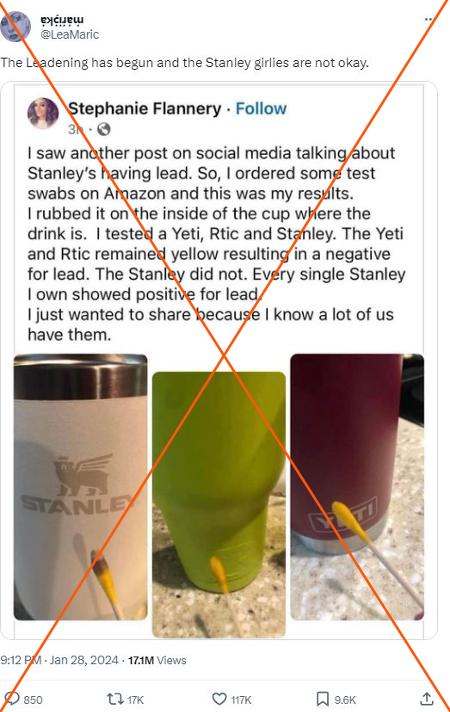
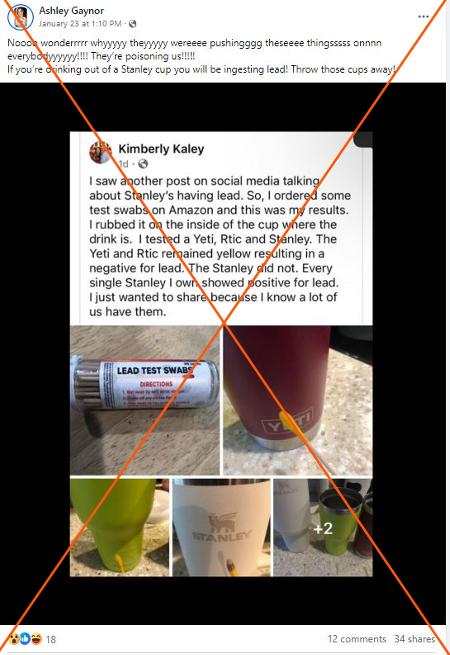
The insulated cups have been a cultural phenomenon for years in the United States, thanks in part to promotion from social media influencers.
People can be exposed to lead from fuel, paint and plumbing, as well as smelting sites and batteries. Contamination can also occur in drinking water and foods stored in tainted containers.
"Consuming even small amounts of lead can be harmful and lead poisoning from these items can cause illness or death," the Centers for Disease Control and Prevention says on its website (archived here).
But there is no evidence of lead poisoning linked to the Stanley tumblers.
A company spokesperson on February 2 directed AFP to an online statement that says the manufacturing process includes an "industry standard pellet" to seal the cups at their base -- and that such material includes "some lead." US media report Stanley is not the only brand using the method.
"Once sealed, this area is covered with a durable stainless steel layer, making it inaccessible to consumers," Stanley's statement says (archived here). "Rest assured that no lead is present on the surface of any Stanley product that comes into contact with the consumer nor the contents of the product."
Marty Cohen, professor of environmental and occupational health sciences at the University of Washington, agreed.
"Without having any data, it seems like if the cup is intact, there should be no exposure," he told AFP on February 2. "If the bottom disk has been removed, there is the possibility for exposure."
However, he said the extent of the exposure would depend on several factors, such as the length of contact and the amount of lead in the pellet.
"Most forms of lead don't readily pass through the skin," Cohen said.
Tumblers test negative
AFP ordered at-home kits (archived here) similar to the ones displayed on social media to test the presence of lead on the surface of two Stanley products.
The ashy swabs turn yellow once activated with white vinegar, per the test's instructions.
"If swab turns red/violet or pink, there is likely lead present," the directions say.
AFP tested the sides, bottom and inside of two different Stanley tumbler models. All of the swabs remained yellow, showing no potential trace of lead.
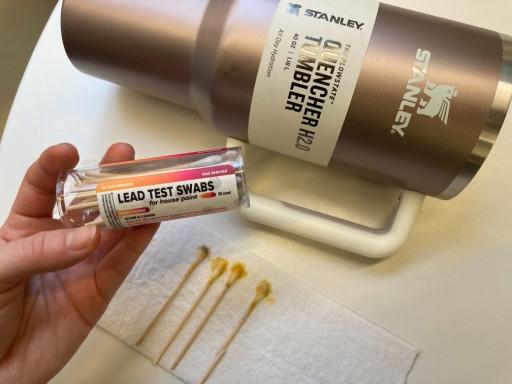
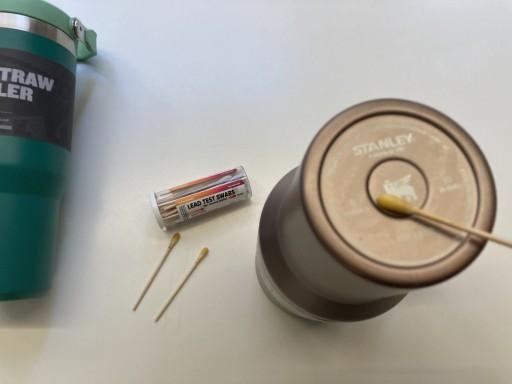
The instructions note, however, that the test "is not intended to replace a professional inspection." Several federal agencies also do not recognize the results of self-conducted testing.
The US Consumer Product Safety Commission (CPSC) said in a 2007 statement (archived here) that its testing of some common kits on paint and other products "did not detect lead when it was there (false negatives)," while "some indicated lead was present when it was not (false positives)."
The US Environmental Protection Agency (EPA) recognizes just three kits that comply with the Renovation, Repair and Paint (RRP) Rule for testing lead-based paint in households (archived here and here).
Jeffrey Landis, a spokesman for the agency's Office of Chemical Safety and Pollution Prevention, told AFP in a March 6 email that while there are others on the market, the EPA "does not evaluate or recognize test kits for use on consumer products" such as cups.
No recalls
Neither Stanley nor any US agencies had issued recalls for the company's insulated cups as of February 6.
"The FDA is aware of the situation. The agency has not received reports of lead poisoning concerning these cups at this time," an FDA official told AFP in a February 2 email.
However, they said that "as a general precaution, consumers should avoid drinking from broken or damaged cups."
Patty Davis, press secretary for the US Consumer Product Safety Commission (CPSC) -- which handles cases of potential lead contamination through touch -- said the agency "cannot comment on this company or its product under our statute."
She told AFP on January 30 that people should "report incidents or safety concerns with consumer products to CPSC. They can also search for product recalls there."
Lead in children's products is regulated under federal law (archived here). The CPSC has issued recalls for children's tumblers with excessive levels of lead from other sellers -- but not Stanley (archived here, here, here and here).
AFP has debunked similar claims about KitchenAid here.
This article was updated with more information about the reliability of at-home lead testing kits.March 6, 2024 This article was updated with more information about the reliability of at-home lead testing kits.
Copyright © AFP 2017-2026. Any commercial use of this content requires a subscription. Click here to find out more.
Is there content that you would like AFP to fact-check? Get in touch.
Contact us
